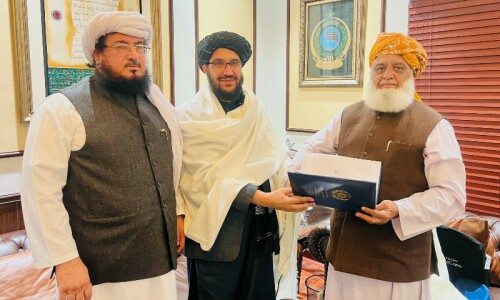ISLAMABAD: The Foreign Office on Thursday downplayed the Afghan Taliban administration’s invitation to Maulana Fazlur Rehman, leader of the Jamiat Ulema-i-Islam (JUI-F), in a bid to reduce tensions with Pakistan, characterising the gesture as a personal visit and emphasising lack of official knowledge about the initiative.
“That question may be best addressed to the Afghan authorities because we are not aware of any such initiative,” FO spokesperson Mumtaz Zahra Baloch said at the weekly media briefing while responding to a question about the invitation for the JUI-F chief.
In response to another question, she said: “We do not comment on visits or invitations for private individuals to foreign countries.”
Earlier this week, Zabihullah Mujahid, a spokesperson for the Afghan Taliban, said the Taliban administration had formally extended an invitation to Mr Rehman to inform him about the desires and goals of the Afghan government and its citizens regarding Pakistan.
Mr Rehman’s influential role in religious and political circles positions him as a key mediator. This initiative reflects the Afghan Taliban’s shift towards diplomacy to address tensions with Pakistan and improve bilateral relations, signalling a significant step in resolving ongoing security issues and fostering cooperation between the two countries.
The FO spokesperson, however, clarified that Islamabad’s position on the issue of talks with TTP, an option advocated by the Afghan Taliban, was “very clear”.
“There are no talks taking place, and there are no talks on the agenda between the State of Pakistan and TTP. We are focusing on the demand that Afghan authorities must take action against TTP elements and rein them in so that the terror threat against Pakistan from the Afghan soil is eliminated,” she added.
She reiterated concerns about possession and use of modern sophisticated arms and weapons by TTP and called for international cooperation for neutralising the threat.
Pakistan is deeply worried about the US military equipment now in the hands of TTP. The concern on the issue was recently renewed by caretaker PM Anwaarul Haq Kakar, who saw it as a significant security challenge because it enhanced TTP’s fighting capabilities.
The spokesperson confirmed that Pakistan was in talks with US for enhancement of Pakistan’s counter-terrorism capacity.
Explaining Pakistan’s engagement with the US and other neighbours of Afghanistan on counter-terrorism cooperation, Ms Baloch said: “We have no designs to create difficulties for the people of Afghanistan. Our complete focus is to bring peace and stability in Afghanistan and to work with our Afghan brothers and sisters to ensure that terror threat from Afghanistan does not target Pakistan.”
Asked to comment on reports about arrest of TTP fighters by Taliban, the spokesperson said: “We are yet to see substantive facts and action that would result in effective results on the ground with the reduction of terror incidents being sponsored by TTP that is now holding sanctuaries inside Afghanistan.”
Published in Dawn, December 22nd, 2023














































Dear visitor, the comments section is undergoing an overhaul and will return soon.